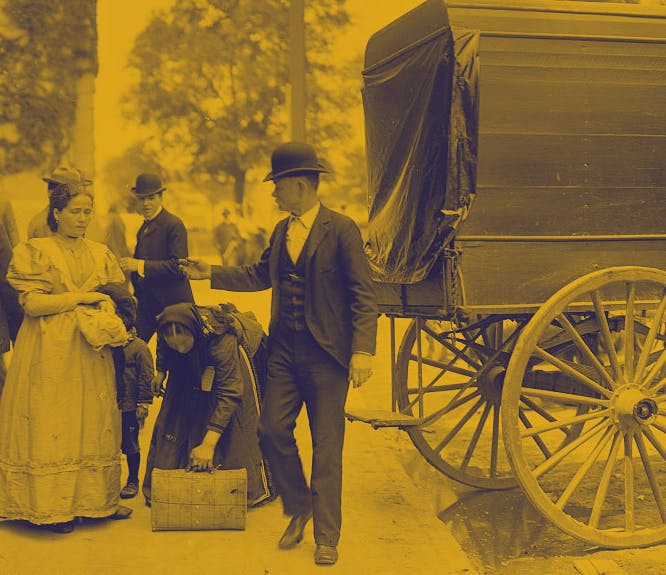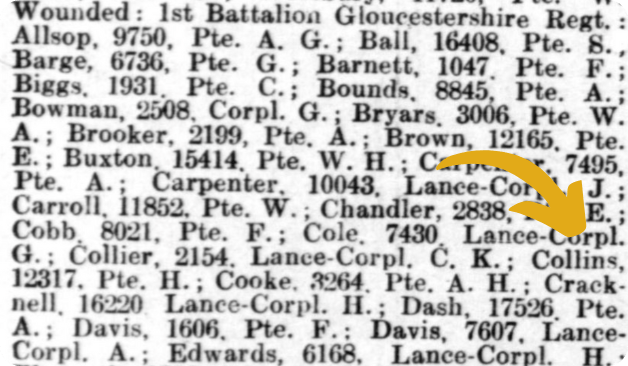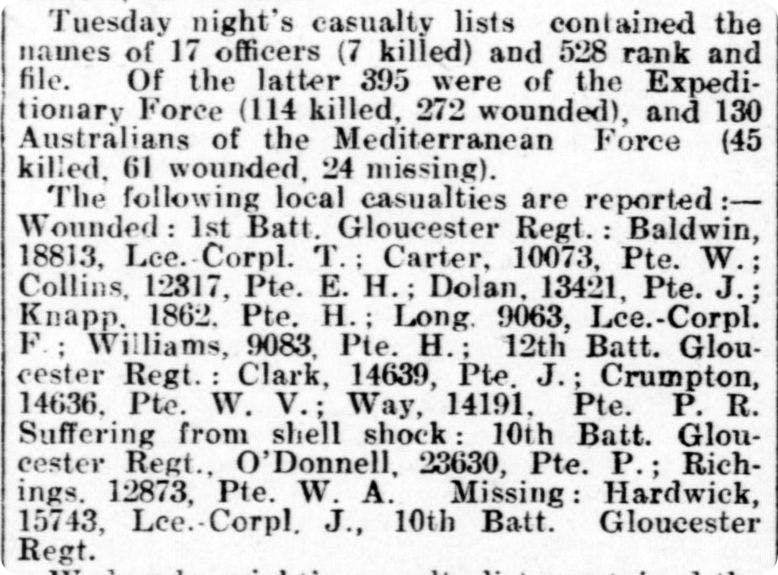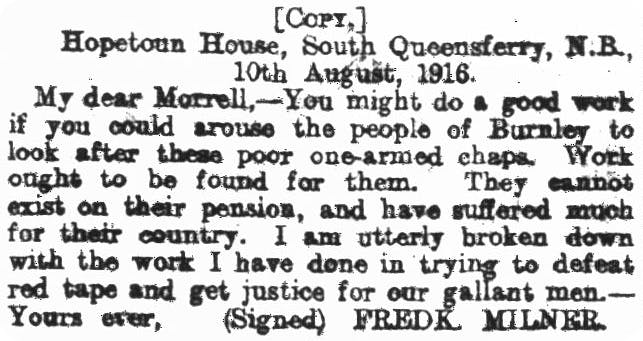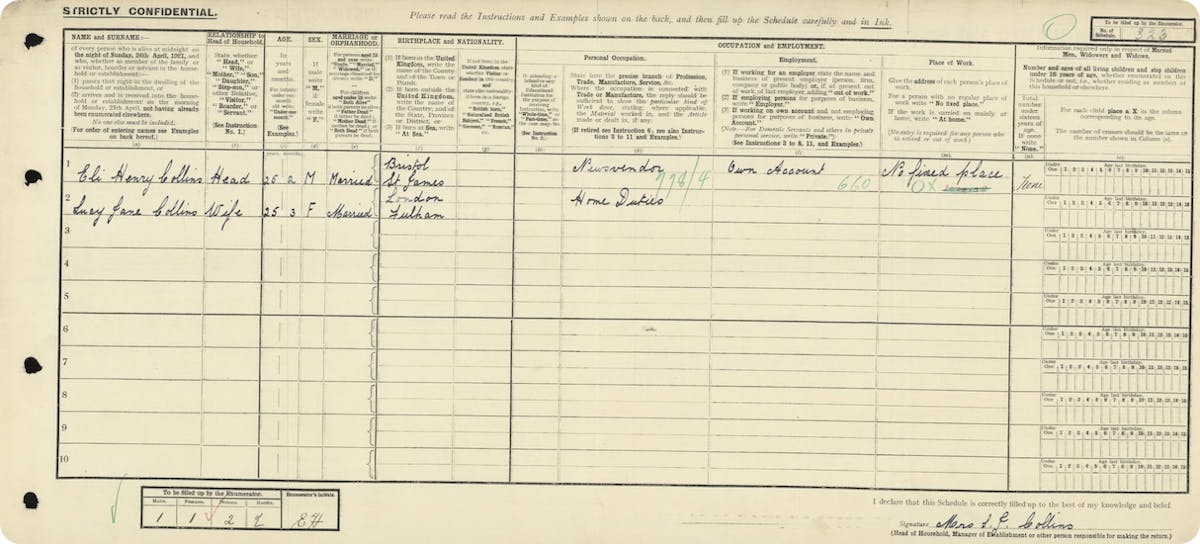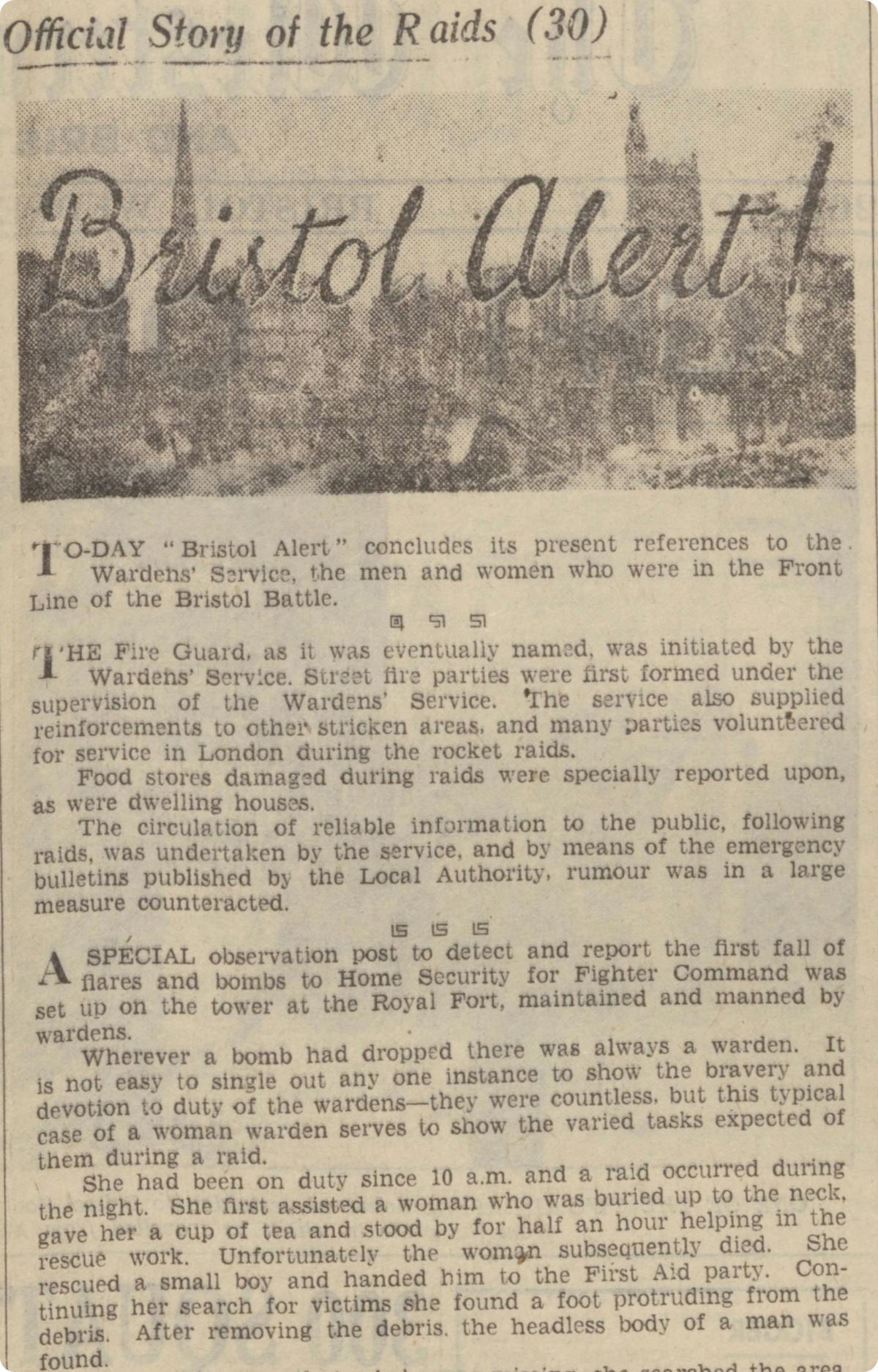Finding Eli: A granddaughter’s story
7-8 minute read
By Daisy Goddard | July 11, 2024
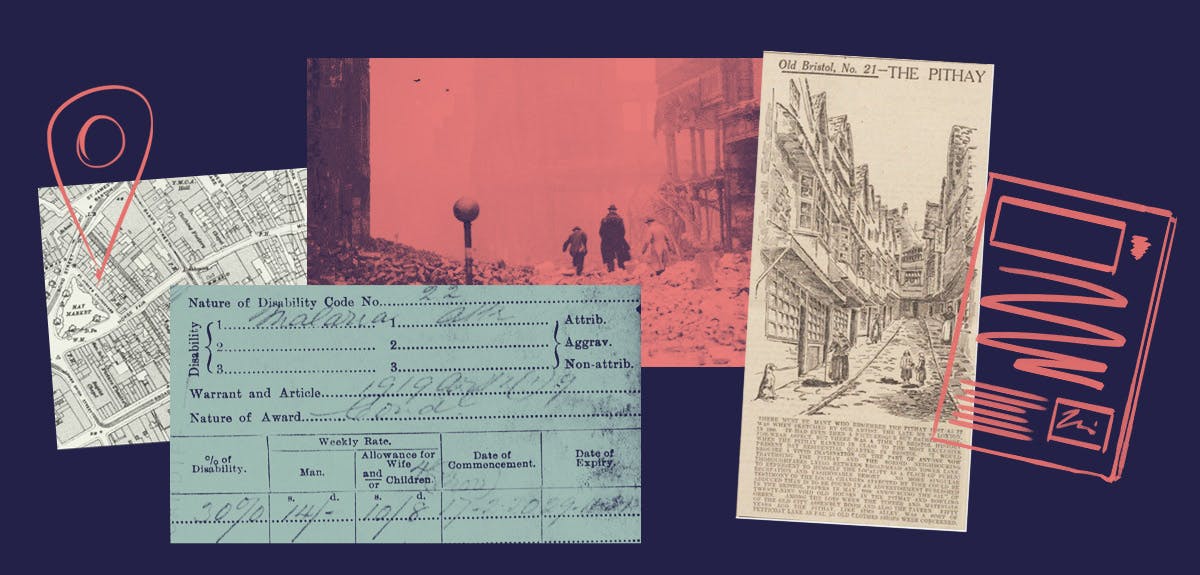
We took Laura Collins on an unforgettable family history journey. This is the inspiring story of her great-grandfather, Eli.
Last year, we took a member of our community on an epic journey to trace the footsteps of her 2x great-grandmother Janet. We traced Janet’s life – from her birth in 1830 up to her life as a ship captain in Liverpool by the 1860s – and uncovered a tale of tragedy and perseverance. Watch Finding Janet.
We’re back with yet another moving real-life tale.
Growing up, Laura Collins knew that her great-grandfather Eli had lost an arm during the First World War. But beyond that, his life was a mystery. Our expert genealogists took Laura on an unforgettable journey.
We traced Eli Collins in our historical records and newspapers, discovering how he served his country in both world wars. As Laura discovered, Eli endured great hardship throughout his life.
Dig even deeper into the story behind Finding Eli – here's everything that our research uncovered.
Finding Eli was made possible thanks to our video partners and contributors. We'd like to extend our thanks to Beth Moore (The Great War Group and Len Evans (director and trustee of the Soldiers of Gloucestershire Museum and National Army Museum).
Who was Eli Collins?
Eli Henry Collins was born in Bristol on 9 April 1896 to parents Frederick (b.1856) and Elizabeth (b.1859). He was one of six children in a large and bustling family. He had four sisters: Catherine, Frances, Agnes and Emma, and an older brother named Charles.
The Collins family lived around Bristol throughout the 1890s and 1900s. In 1901, when Eli was five, they lived at Tippets Court. Frederick was working as a carter, while Elizabeth was a laundress.
Jumping ahead ten years, Eli is still living at Tippets Court, aged 15. His mother is listed as the head of the household, supporting her six children by working at the nearby Bristol Royal Infirmary Laundry.
Eli's military service
Eli Collins was aged 18 when the First World War broke out. Like most working-class men of his age, he enlisted in the army. He served with the 1st Battalion, Gloucester Regiment, a line infantry regiment formed at the end of the 19th century.
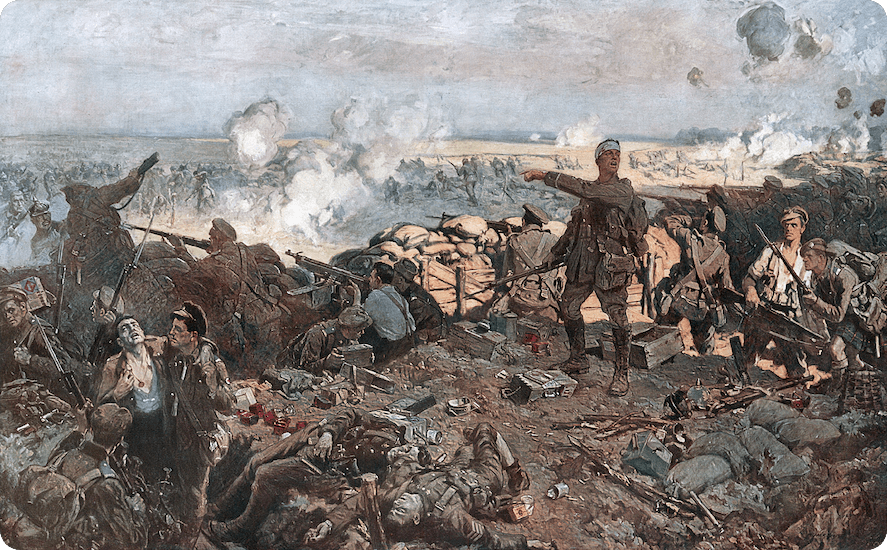
Second Battle of Ypres, Richard Jack, c.1917.
His regiment was deployed to the front in August 1915. As our records indicate, the 1st Battalion was involved in several major battles. These include:
- The First Battle of Ypres (19 Oct – 22 Nov 1914)
- The Battle of Aubers Ridge (9 May 1915)
- The Battle of Loos (25 Sep – 8 Oct 1915)
- The Battle of the Somme (1 Jul – 18 Nov 1916)
For his bravery, Eli was awarded the 1914-15 Star.
Eli’s first injury
During this time, Eli was injured in action. Within our newspaper collection, we found Eli mentioned in the Gloucester Journal on 30 October 1915. Among many other men, he is listed as wounded.
Historical records and newspapers indicate that Eli was most likely injured on 8 October 1915 – when the 1st Battalion was involved in the assault on German trenches during the Battle of Loos. The unit’s war diary lists 22 killed and 96 wounded from ‘other ranks’.
Major fighting at Loos ceased on 13 October 1915. This deadly battle claimed over 61,000 British casualties and over 7,700 deaths. Laura was moved to discover her great-grandfather's role in these historic events and to see his Battalion commemorated on Panels 60-64 of the Loos Memorial.
Disaster strikes again
Just four months later, Eli was injured again, while his battalion was stationed in the trenches of Posen Alley. We find his name listed in the casualty list printed by the Gloucester Journal on 22 January 1916.
His injury is noted even earlier in the military records – the date of injury is pinpointed as 9 January.
But his’ heroism did not go unnoticed. Eli was awarded the British War Medal and Victory Medal, as well as the 1920 Silver War Badge.
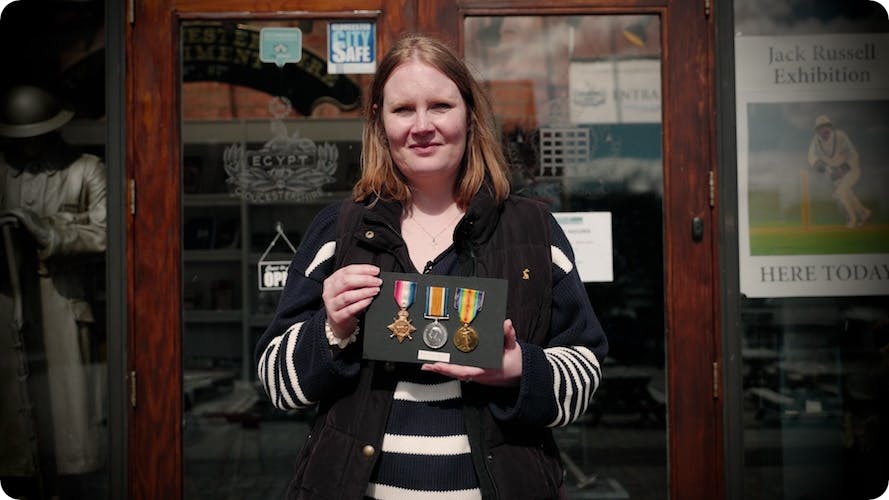
Laura with her great-grandfather Eli's war medals.
But what else can we uncover about the major injury that Eli suffered in January 1916, aged 19?
Laura knew that her great-grandfather lost an arm fighting in World War One, and although none of Eli’s military records state this explicitly, we can deduce that it was a result of this injury in the French trenches.
After the injury of 9 January, Eli spent 286 days in recovery. He spent much of this time at the Queen Mary Hospital at Roehampton, before being formally discharged on 11 October 1916. After his discharge from the hospital, he worked in domestic service.
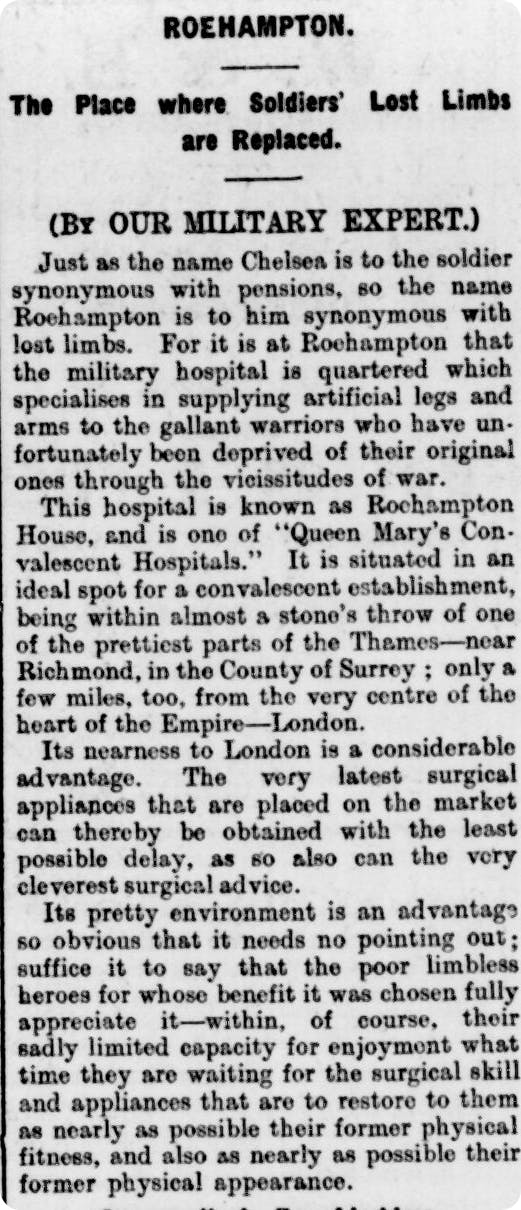
Roehampton's military hospital was described in the Streatham News, 27 October 1916.
The above clipping offers insight into the rehabilitation work carried out at Queen Mary Hospital.
This injury would have been life-changing for Eli. From enlisting aged just 18, he returned to his native Bristol missing a limb and undoubtedly marked by the intensive active service seen by his Battalion over a short period.
Over 700,000 British soldiers suffered limb wounds during the First World War – over 41,000 soldiers underwent amputations.
Met with pity by society at large, soldiers who had lost a limb faced difficulties on all fronts when returning home. They were often unable to work as they had before, forced to beg on the streets. In most cases, these men became dependent on charity and/or public services for the rest of their lives.
The silver lining to Eli’s story
Despite suffering a life-changing injury aged just 19, Eli Collins’ life was far from over. Around the time that he was recovering and re-entering the workforce in Roehampton, Eli met local woman Lucy Jane Nash. Aged 20, Lucy was the son of a porter named William Nash and lived just 2 miles from the Queen Mary Hospital.
The pair were married in Surrey’s Mortlake Parish on 28 January 1917.
We found Eli and Lucy together in the 1921 Census, at 12 Thomson Road, Bristol. Both are aged 25 by this point. Eli is working as a newsagent (‘on his own account’). Interestingly, the return was filled out by Lucy, reflective of Eli’s war injuries.
The couple would go on to have seven children, five of whom survived into adulthood. Robert, Laura’s grandfather, was born on 4 December 1930. The family lived in and around Bristol for over two decades.
The Collins' wartime heroism doesn't end there
Despite the immense sacrifice he’d already made in 1916, Eli stepped up once again when the Second World War broke out in 1939. By this point, he and Lucy were aged 43 and living at 100 Blackswarth Road, Bristol with their children.
In the 1939 Register, Eli, Lucy and their 18-year-old son Dennis were all listed as ARP (Air Raid Precautions) volunteers.
The ARP Committee were established in Bristol in 1935. Organized into six Civil Defense Districts, brave volunteers worked throughout World War 2 to keep their neighbours safe and maintain order in the face of German attacks.
The ARP Committee had been established in Bristol in 1935. Organized into six Civil Defense Districts, brave volunteers worked throughout World War 2 to keep their neighbours safe and maintain order in the face of German attacks.
The Western Daily Press described the heroic work of ARP volunteers:
"Wherever a bomb dropped there was always a warden. It is not easy to single out any one instance to show the bravery and devotion to duty of the wardens – they were countless… "
As air raid wardens, Eli, Lucy and Dennis’ many duties would’ve included everything from distributing gas marks to first aid, putting out fires and helping to clear rubble.
Laura’s genealogy journey: discovering the war heroes and strong women in her family
Laura was incredibly moved to discover that her great-grandfather Eli had played an important role in both world wars.
The strong character of Lucy also stands out – she upheld her family despite Eli’s injury, and together, the couple withstood great challenges. They lost two children and survived two world conflicts at one another’s side.
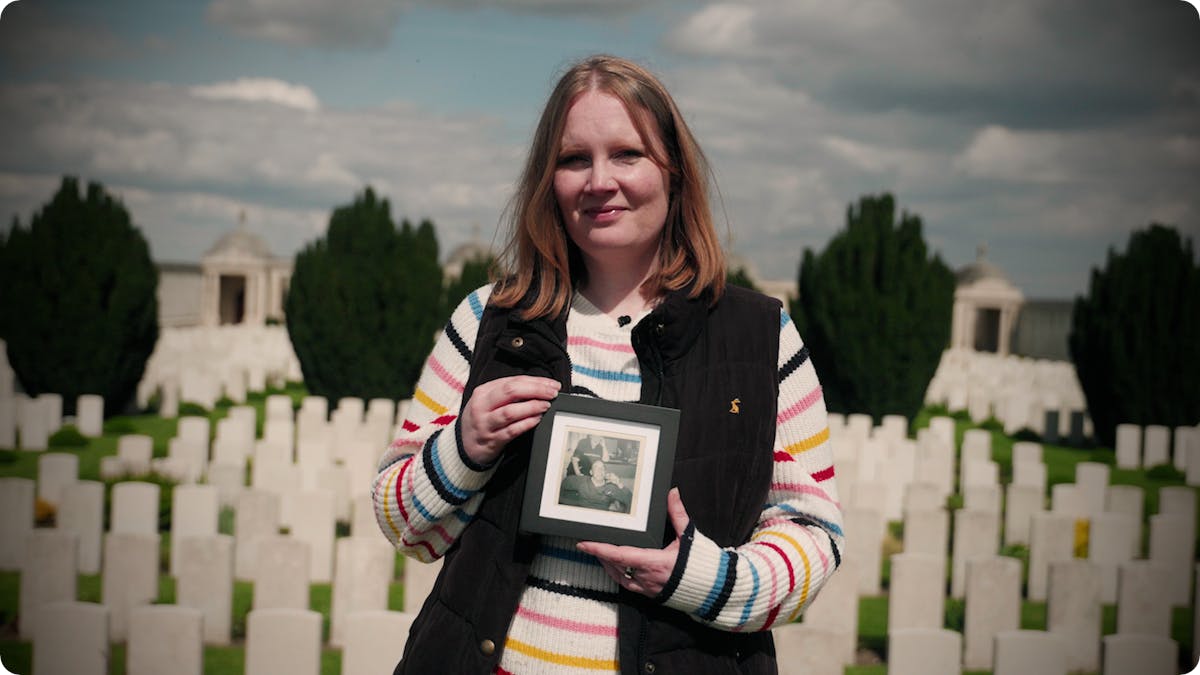
Eli died in 1972, aged 76, while Lucy passed away in 1966. They remained in Bristol until their deaths, as did many of their children, including Laura’s grandfather, Robert.
Have you made a surprising family history discovery? Whatever you've uncovered about your past, we'd love to hear about it. You can now get in touch and tell us using this handy form.
Related articles recommended for you

Who Do You Think You Are? Series 21: here's what you missed
Discoveries

Exploring the family trees of Team GB’s gold medallists
Discoveries
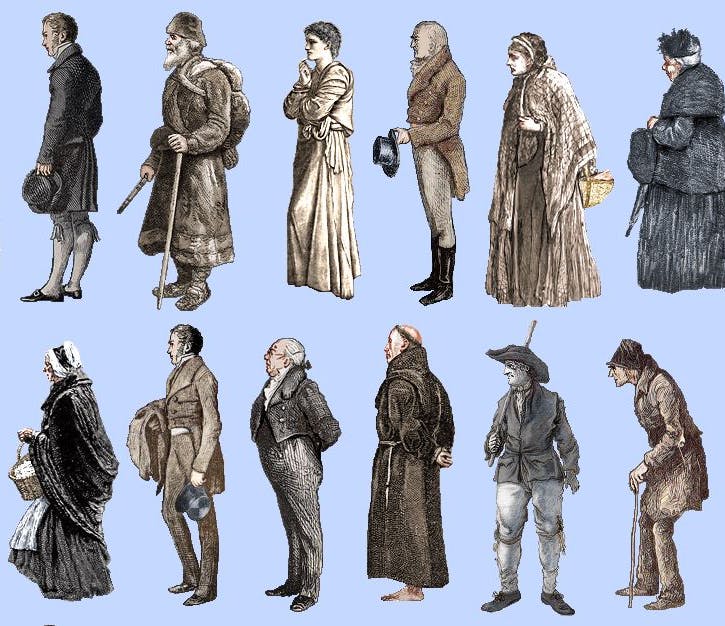
6 easy ways to trace your family tree back to the Victorian era
Help Hub
